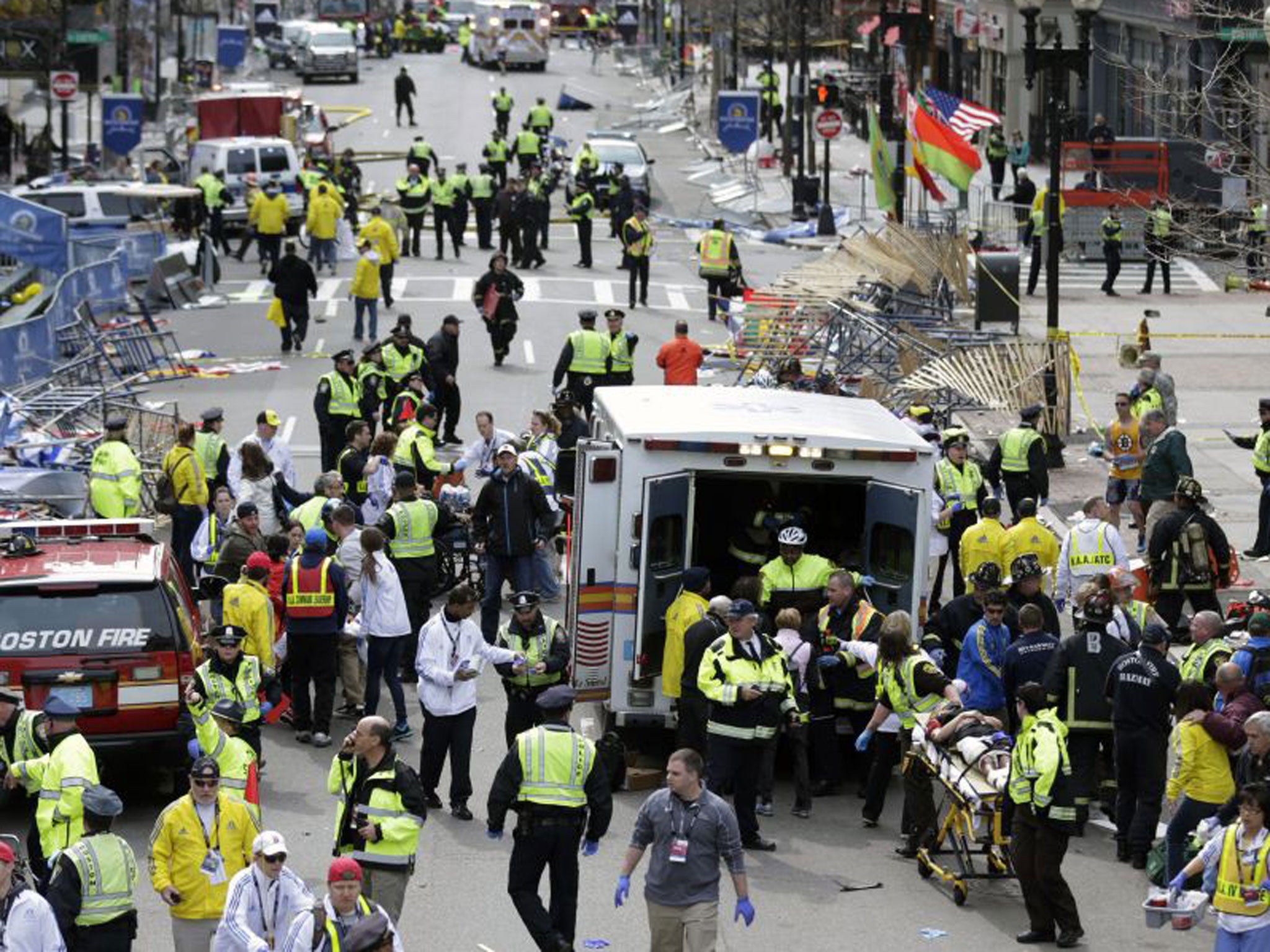The Boston bombing has shown how America's old certainties are under attack
America used to have a childlike belief in the power of freedom, and the power of firearms to defend that freedom

It’s difficult for a British person to understand the shock felt by America after Monday’s bombings in Boston – events that are all the more ferocious for their seeming assault on this, perhaps the most civilised and storied of all American cities. A place where its liberty and democracy began. A place which has its own holiday: Patriots’ Day.
Tuesday’s front page of the Boston Globe said it all – a photograph of a bloodied young woman lying on the pavement, with an ad hoc tourniquet being applied to her upper leg. Shockingly, those civilised pavements – used to shoppers and strollers in this eminently walkable city – were now splashed with bright red, fresh blood. It was an unconscionable scene. Indeed, “tourniquet” itself became a kind of leitmotif of the week, with NPR news items devoted to the technique. It was hard not to see a certain symbolism in the improvised bandages applied to stem the emotions of a bleeding nation.
The real violence of those explosions was all the more vivid for me, here in New England, and knowing those genteel Boston streets so well. Seeing them burst open – from what we now know to have been improvised devices made, prosaically but with appalling cruelty, from pressure cookers filled with ball bearings – seemed to tear at the heart of American surety.
More and more, it seems, that surety is under threat, and as much from the potential enemy within – to coin a Thatcherite phrase – as without. How telling that this shocked nation should end its week of trauma with its politicians being fiercely reprimanded by their president over gun control. A man in whom so much hope was invested struggles against what looks to us like wicked intransigence.
The unspoken implication in Obama’s tirade was that such insistence on the right to bear arms is tantamount to complicity in the senseless violence – from the school shootings that brought matters to this head to the events in Boston.
Here on Cape Cod, the cold northerly winds were beginning to abate as a sunny morning dawned on Patriots’ Day. In the distance lay Long Point and its lighthouse at the very tip of the Cape – a place where, as Henry David Thoreau put it, a man may stand “and put all America behind him”. Boston lay over the horizon, a misty mirage in the west. It was mid-afternoon when the news came in on the car radio. At first it seemed a minor disruption; a silly stunt, perhaps. Then, as the news grew more serious, it spread over the day, absorbing the attention of the media as the true scale of the horror became apparent.
My friend Dennis Minsky, a naturalist here on the Cape, and a usually phlegmatic, measured man, couldn’t withhold his anger. Like Obama, he lost his temper. “F***ing bastards.” He’s usually much more eloquent. But the words burst out of him, and the pain was visceral. Americans take these things personally; there is no world-weary cynicism here. The next day, flags flew at half-mast in this little seaside town of Provincetown, and church services were held. Grown men wept in their pews in St Mary of the Harbor Episcopal Church, “where the land, the sea, and the sacred meet”.
The emotion was unashamed. Commentators spoke of Boston as the historic heart of America, capital of this New England and a new republic; the same sense of freedom celebrated in its marathon, even as the city looked out bravely to the Atlantic and the world beyond. Yet there is a new equivocation, too, one which has blurred the boundaries between war and peace – bequeathing a new moral ambiguity, under which America, more than anywhere else, now labours.
At dinner here a couple of nights before, I’d sat next to Brendan, a young Bostonian in his early twenties who’d just returned from Afghanistan, where he served as a sergeant in the airborne regiment. With his shaven head and his rugby shirt and faded combat trousers, there was an aura of military glamour about him. But he spoke bitterly of the disconnection of modern warfare – how he and his comrades were subject to bullets and IEDs, while their fellow soldiers sat in air-conditioned rooms in Washington, controlling drones.
In America, as elsewhere in the west, death is dealt from afar (which is why 9/11, and now Boston, hit so hard). The violent birth of this nation has ceded to war waged like a computer game. Ordinary soldiers, with the dirt and blood of their duties on them, are less valued than their hi-tech counterparts. Brendan noted, dryly, that in the order of military awards, such operators received higher awards than ordinary soldiers.
America is a less constant place now. It once held to its utopian aspirations. It was a place of stalwart optimism. It had an almost childlike belief in the power of freedom – and the power of firearms to defend it. But the 21st century is biting away at such old certainties, leaving a future perceptibly less assured. Meanwhile, North Korea stages its own pantomimic threats – taken all too seriously by the Obama administration.
This morning the week’s spring sun has disappeared behind a shroud of dense cloud, and a veritable storm has blown in from the Atlantic. The brent geese and mergansers have taken cover, and the wooden house in which I write, perched over the shore, seems fit to be blown away and into the bay like some latter-day Ark. It won’t be, of course. It will stand firm, defended by its battered bulwarks that have held out against decades of storms. But for how much longer?
Philip Hoare’s most recent book is ‘Leviathan – or the Whale’, published by Fourth Estate